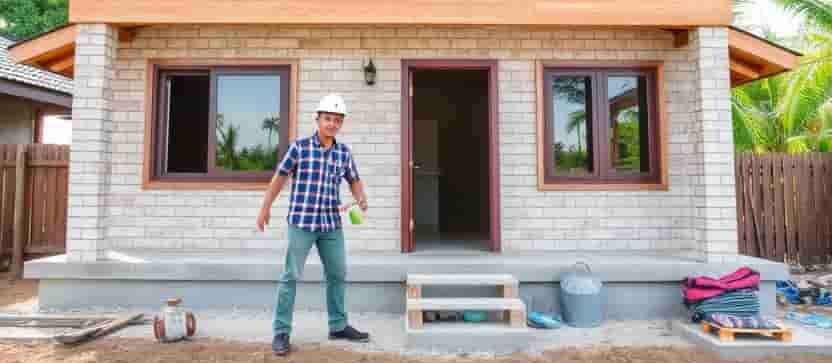- About Us
- Legal Services
- Family Law
- Property
- Marriage
- Immigration
- Contact
- Payments
The Building Control Act has inspector who enforce the law. Note that you have to have the correct permits for what it is that you want to complete. We have explain it here under the article called construction permits fees. You will note that you have the following permits. Note that you will need a building permit in Thailand for construction of a new building. Likewise you will also need a permit for altering an existing building. In addition there is also a permit needed for demolition or relocation of the building. Likewise usage change of a building. Entrances and exists would be the same as well as changing the parking.

Local competent officers have the authority to halt illegal construction, modification, demolition, or relocation of buildings. They can order:
– The owner or responsible parties to stop the work.
– Prohibition of building use in areas under violation, with conspicuous signage.
– Likewise review of orders within 30 days should it be needed.
Should there be violations and it can be corrected. Then the inspector can order you as the building owner the ability to submit a correction application. Likewise make necessary adjustments within a set time frame which could be extendable if needed.
If the issue is uncorrectable or orders are ignored, officers can command **demolition** within a specified period, with guidelines set by regulatory standards (MR or Bye-laws).
– Failure to demolish the building as ordered allows the officer to:
– Request court action for arrest/detention of non-compliant individuals.
– Conduct demolition themselves at the owner’s expense and possibly seize or sell materials from the demolition to cover costs.
Use of buildings without necessary permits or certificates can be stopped until proper documentation is provided.
In case of violations that alter the area or structure, the officer can demand **restoration to original condition** and apply penalties for non-compliance.
Buildings or areas deemed hazardous to health or property, even if legally built, may require improvements for safety. If not, demolition orders may be enforced.
Hazardous or unsafe equipment (e.g., fire systems, drainage) must be repaired or replaced within a specific timeframe. If you do not comply then this could lead to building use restrictions.
Notice Procedures: The orders has to be a written order. This needs to be sent to involved parties. They may also place a public notice at the building site. This is deemed acknowledged after a specified period.
Note that the inspectors can enter buildings to inspect compliance with this law. They may also question individuals as well as request documents.
Delegation of Powers: Note that inspectors can appoint qualified technical staff to assist in the enforcement of the law. Should cases where architects or engineers are suspected of complicity in violations. The inspector can then also notify relevant licensing boards for further action against them.
Building Control Act
Building Control Act
Building Control Act
Building Control Act
These sections which we have highlighted allows inspectors the ability to ensure that building activities comply with legal and safety standards. They do have the authority to intervene and enforce compliance. This can be through corrective actions, demolition, court orders, or penalties where needed.
Note that the technical inspection powers have been added below. See also the article on the running a factory in Thailand as well as the supervision of the factory in Thailand. Lastly there is also the Thailand factory license as an issue.
Upper Technical Officials (Nai Chang) and Technical Officials have authority to enter sites where building activities (construction, modification, demolition, or relocation) are ongoing to ensure compliance with the Act.
They may:
Question individuals on-site to gather information.
Request documents or relevant evidence from those working or living at the site.
Upper Technical Officials may enter a building and the surrounding area if there is reasonable suspicion of a violation or non-compliance with the Act, specifically regarding:
Illegal construction, modification, demolition, or relocation.
Misuse of the building contrary to Section 32, 33, or 34.
Safety or health hazards as defined under Section 46.
They have authority to inspect, question people present, and request necessary documentation or evidence.
Inspections by the Upper Technical Official or Technical Official must be conducted during daylight hours or normal work hours of the site.
Inspectors while on site have to show their identification card upon request. This to confirm their authority. The ID format of this card is specified in regulatory rules (MR).
Restriction on Inspection: Only inspectors designated under this Act. Only they are authorized to perform inspections. This as is required in Section 32bis. Likewise unauthorized individuals are prohibited from conducting these inspections.
Inspector Accountability: If an inspector conducting an inspection as per Section 32bis violates the Act, regulatory rules (MR), or by-laws, the procedures outlined in Section 49bis for disciplinary or corrective action will apply to them as well.
These provisions in Chapter 6 ensure that inspections are carried out by authorized personnel with accountability measures in place, aiming to maintain compliance and safety in building practices across Thailand.
Likewise also see the article that we wrote on the the notary public Bangkok for those who wish to have their documents notarised. Lastly we also wrote an article on building control act for theatres.
The information contained in our website is for general information purposes only and does not constitute legal advices. For further information, please contact us.
